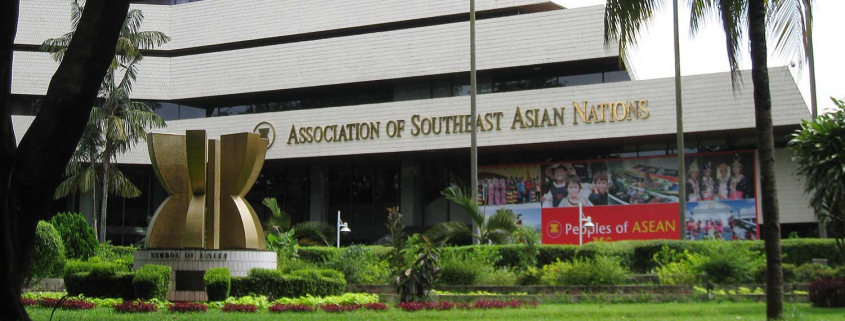It is confirmed – Jakarta remains the Capital of ASEAN
Written by Truston Yu
On Sunday 6 October at the Economic Research Institute for ASEAN and East Asia’s (ERIA) editors’ roundtable in Bangkok, ASEAN Secretary-General Lim Jock Hoi affirmed that the ASEAN headquarters will not be relocated and shall remain in Jakarta.
From the moment Indonesian President Joko Widodo first announced plans to relocate the country’s capital city until now, there have been numerous speculations on the future of the ASEAN Secretariat. Looking back with half a year of hindsight, this article examines the uncertainties that are now ascertained, and outlines potential elements of a blueprint for Jakarta as the capital of ASEAN.
In April almost immediately after incumbent Joko Widodo declared victory in the 2019 Indonesian Presidential Election, the National Development Planning Agency (Bappenas) announced plans to move the capital city from Jakarta to outsideJava.
In response to this announcement, the author published an article the following month analyzing the implications of such a move, identifying the future of the ASEAN Secretariat as a point of interest. The article argued that there was no need for an intergovernmental organization to be located in a national capital, not to mention relocating along with a national capital’s relocation. By that extension, Jakarta is set to remain as the seat of ASEAN.
On 26 August, two weeks after the inauguration of the new ASEAN Secretariat building, President Joko Widodo unveiled the location of Indonesia’s new capital city – in East Kalimantan spanning North Penajam Paser and Kutai Kartanegara.
Again, in response to such an announcement, this article paints an idealistic picture of the “post-capital” era Jakarta. And again, the said article also argued that ASEAN would not be moving out of Jakarta, this time citing the fact that the ASEAN had recently moved into a newly built Secretariat building.
This week, all the above propositions have come to be verified by the top diplomat of Southeast Asia – Secretary-General Lim Jock Hoi.
Jakarta has been affirmed as the diplomatic capital of ASEAN as early as 2012, and this will remain unchanged in the foreseeable future, if not perpetuity. The ASEAN Secretariat has been entrenched in Jakarta since its establishment in 1981. On 8 August, 52 years since the Bangkok Declaration that gave birth to the ASEAN was signed, the brand new IDR 500 billion ASEAN Secretariat building was inaugurated. ASEAN now has a bigger, newer and taller building right next to the old one, which was a factor cited by Lim in his speech, “And we believe that Jakarta will be the capital of ASEAN.”
Now that Jakarta no longer takes the spotlight as the national capital, there would be greater freedom and challenges in its own quest for development. As for Indonesia, this new arrangement could be interpreted as positive towards downplaying the perception of Indonesian dominance in the regional bloc. Indonesia is, after all, a founding member of the ASEAN, its biggest member state, economic and military power and even housed the ASEAN Secretariat in the foreign ministry between 1976-1981 before it moved to what is now called the Heritage Building at Jl. Sisingamangaraja.
Having the presidential office and ministry buildings migrated does not mark the end of Jakarta; and it certainly does not mean an abandonment of Southeast Asia’s regional capital and biggest megalopolis. In fact, the Jakarta government owes an obligation to the wider international community just as Geneva of Switzerland or New York of the United States does. As the host of some seventy missions to the ASEAN, part of Jakarta’s continued responsibility includes the display of hospitality. Jakarta remains to be the face of the Republic, even more so than its new capital. From a domestic point of view, Jakarta bears this burden of presenting Indonesia to the world and the Jakarta administration is pressured to demonstrate good governance.
Indeed, Lim likened Jakarta to New York: “We would like to see this like what we have in New York where the United Nations [is seated] and the ASEAN Secretariat will be the anchor for the ASEAN capital in Jakarta.”
Being a regional capital also means it is not only Indonesians who should be able to contribute to shaping the future of Indonesia’s biggest city, all Southeast Asians should have a voice in building this regional hub. From Indonesia’s perspective, this continual development of Jakarta into Asia’s world city would be a brilliant way to strengthen and display its soft power. It is also in the interest of the wider Southeast Asian community as a whole to elevate the status of this Southeast Asian hub, bringing it on par with Geneva and asserting ASEAN’s significance in the international arena.
After some ten years the legislature, ministries and embassies in Jakarta would all be relocated to Kalimantan; what remains are the Secretariat, affiliated organizations and offices of permanent representatives.
What would the new Jakarta look like in ten years time? Perhaps this is a new page to be written together by Jakartans, Indonesians and Southeast Asians alike.
Truston Yu is a Southeast Asianist from the West Java town of Cirebon. Truston has worked as a research assistant on Southeast Asian politics at the University of Hong Kong and at Keio University. Truston’s research interest also includes Public International Law, making ASEAN Studies a unique intersection of the two disciplines.Truston could be reached through e-mail trustonyuofficial@gmail.com.





Leave a Reply
Want to join the discussion?Feel free to contribute!